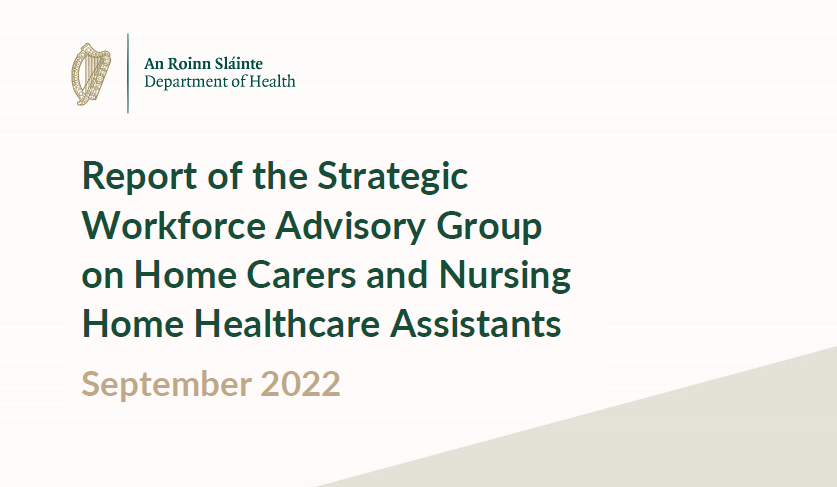
SIPTU says employment permits do not resolve retention issues of home care workers
A recent government announcement that 1,000 General Employment permits will be made available for home care workers from January 2023 will not address the core issues of recruitment and retention of carers in the home care sector, according to SIPTU Organiser, Pat Flannery.
He said: “SIPTU members have previously raised concerns following publication of the ‘Report of the Strategic Workforce Advisory Group on Home Carers and Nursing Home Healthcare Assistants’ in September 2022 that the recommendations did not go far enough to address the crisis of staffing within the sector.
“The announcement made on 30th November last by junior minister, Damien English, that work permits will be made available for home care workers from January 2023 shows a lack of imagination in how the Department intends to deal with the shortage of Health Care Assistants in the home care sector.
“Our members are concerned that the disparity in basic pay and in terms and conditions of employment will continue to exist between workers in public and private employments within the home care sector. As a consequence, workers will continue to vote with their feet and go to work in public employments.
“We note that Damien English has said that the permits being made available will be for full-time positions with a minimum salary of €27,000. A Health Care Support Assistant in the HSE can earn up to €38, 290 and has access to far more favourable terms and conditions of employment including premium payments, travel and mileage payments, as well as access to a pension scheme, which is not available to their private sector counterparts in many instances.
“SIPTU is calling on the minister to prioritise addressing poorer working conditions within the private home care sector and for the Union to be represented on the ‘Implementation Group for the Report of the Strategic Workforce Advisory Group’ which has been established by the Department of Health.”
First meeting of National Radiation Therapist Review Group takes place
SIPTU have welcomed the first meeting of the National Radiation Therapist Review Group which took place today, December 1st.
This first meeting takes place at a crucial time for cancer treatment services. Radiation therapy is used in the treatment of around half of all cancer cases. This treatment is delivered by radiation therapists who, as part of a multi-disciplinary team, have the legal authority to carry out this role. SIPTU has continuously raised the crisis that exists in the recruitment and retention of radiation therapists; and the knock-on effect it is having in delayed treatment for patients. Currently there is approximately a 15% shortage of Radiation Therapists nationally.
Following the meeting Sector Organiser, John McCamley, said “The National Radiation Therapist Review Group will investigate and make recommendations on a range of matters which could alleviate the recruitment and retention crisis among radiation therapists. This will involve exploring areas around safe staffing, career progression, advanced practice, managerial structures and role development for the radiation therapist.”
It is hoped that the Review will contribute to the continued professionalisation of the service to the benefit of staff and patients.

INMO and SIPTU prepare for industrial action over Clifden District Hospital Failures
Members of SIPTU and INMO are preparing to ballot for industrial action due to the failure of the HSE in St. Anne’s CNU and Clifden District Hospital, Clifden, Co. Galway to engage with the trade unions under the auspices of the Workplace Relations Commission, following the unilateral imposition of rosters and failure to be transparent in the future of Clifden District Hospital.
Conciliation talks under the auspices of the WRC failed to progress due to management’s refusal to comply with the provisions of the Public Service Agreement as it pertains to roster changes and service reconfiguration of the service delivered from Clifden District Hospital.
It is the belief of our members that management have orchestrated a situation whereby there is critical shortage of nurses leading to an inability to maintain services on both sites. The blatant lack of workforce planning has resulted in this situation occurring.
Management proceeded to unilaterally impose rosters and have failed to provide any cogent information regarding the future of Clifden District Hospital.
Staff and the community are very concerned regarding the future of Clifden District Hospital.

Sláintecare essential to reform of dysfunctional healthcare system says Shortall
Full implementation of the Sláintecare policy is essential for the effective reform of our health and social care services, Social Democrats co-leader, Róisín Shortall, told the SIPTU Health Division Biennial Delegate Conference in Waterford on Wednesday, 26th October.
Shortall said: “Sláintecare is a 10-year roadmap for reform of our health and social care services, to get us from the current two-tier unfair and unequal and in many ways dysfunctional, health service to a universal single-tier health and social care service where people can access timely care on the basis of health need and not on their ability to pay.
“The Sláintecare report was published in May 2017 so we’re now coming to the end of year five, and the question is ‘What have we got to show for it?’ The first two years consisted of lip-service from the Fine Gael government where the Minister for Health talked the talk but didn’t actually walk the walk. The term Sláintecare became a convenient brand for him to wrap himself in.
“It seemed that most senior government politicians assumed that Sláintecare would go the way of those other health reports and be forgotten. However, when it came to the general election in early 2020, Sláintecare was adopted as official policy by all parties. No one had a Plan B.”
She added: “Like many things in life, the causes of the dysfunction and inequality of our health service are down to political choices, bad choices, which favour vested interest over the public interest.”
SIPTU Health Division Organiser, Kevin Figgis, said “Change is an integral part of working within the health service. Our members have demonstrated their ability to work in a changing environment over many, many years. They will not be found wanting when it comes to engaging with the implementation of Sláintecare.”
He added: “However, as we begin to grapple with what this entails, we will be doing so from the principled position that we will not be engaging with any programme that could be seen as eroding the hard-won terms and conditions that our members have fought for. SIPTU will not be engaging with any reform agenda that includes the outsourcing of our members’ roles to third parties.”
Róisín Shortall addressed the SIPTU Health Division Biennial Delegate Conference in the Tower Hotel, The Mall, Waterford City as a guest speaker on October 26th.

SIPTU Deputy General Secretary says public sector funding faces 5% cut by 2025
Funding for the public sector faces a 5% cut in real terms by 2025, which will result in a decline in services, SIPTU Deputy General Secretary, John King, told the SIPTU Health Division Biennial Delegate Conference in Waterford today (Wednesday, 26th October).
Addressing more than 200 delegates, King said: “The figures would indicate that nominal expenditure on public services will increase by 6% between 2022 to 2025. However, when inflation is factored in, spending falls by 3%, and when population growth is also factored in, spending actually falls by 5%.
“These outcomes are about the implementation of political choices. The effect is not good for public servants and it is not good for wider society. They will lead to poorer services for the less well-off and the marginalised in key areas of public service provision.”
King added: “When we compare Budget 2023 spending on public services to our European Union peer group we find another key result, that is that Ireland is at the bottom of the table when it comes to public service spending. We need to significantly increase our public spending to achieve the quality of service which the citizens in our EU peer group enjoys.”
King also highlighted the failure of the Government to adequately fund organisations that provide services on behalf of the HSE but are not formally part of the public sector.
He said: “The denial of funding for these community and Section 39 organisations for pay increases for their staff, who provide essential public services to our most vulnerable and marginalised citizens and communities, will have profound negative consequences for our society.”
He added: “Last week in the Dáil, in response to a motion submitted by the Labour Party, two senior government Ministers acknowledged that these workers not having a pay rise for 14 years is not acceptable, particularly in light of the cost-of-living crisis that all workers are suffering.
“These workers must not be left out of the ‘whole of government’ response to this inflationary crisis, and I am calling on those Ministers to act now on their words and put in the necessary process to address this issue once and for all.”
The SIPTU Health Division Biennial Delegate Conference in the Tower Hotel, The Mall, Waterford City concludes this evening.

INMO and SIPTU statement on HSE decision to close Clifden District Hospital
The Irish Nurses and Midwives Organisation and SIPTU have said the sudden decision to close Clifden District Hospital is shocking and emergency engagement is needed with staff and representatives through the auspices of the Workplace Relations Commission.
INMO Industrial Relations Officer, Anne Burke said: “The announcement today from the Health Service Executive that they are closing Clifden District Hospital is shocking for the nursing staff, the hospital and wider community. At a time when the health service is struggling so profoundly in terms of capacity, every possible effort must be made to maintain and increase bed capacity in the community – not regressive steps to reduce capacity and in turn create difficulties for both the public and staff.
“Neither staff or their trade union representatives were given prior notice that this decision would be announced today. This flies in the face of all that nursing staff have done to maintain services in Clifden District Hospital, particularly over the last number of weeks.
“It is not acceptable to our members that staff and the community have been treated this way. There is now an urgent need for the employer to engage with staff and their representatives. To this end the INMO is now seeking an emergency conciliation conference under the auspices of the Workplace Relations Commission.”
Commenting on the issue, SIPTU Health Organiser, Yvonne McGrath added: “Our members are deeply shocked at the way they have been treated by management today. This is a dark day for everyone associated with Clifden District Hospital. Despite repeatedly requesting engagement through the trade unions, management have refused to meet and instead have issued this unilateral decision today. It is service users, staff and the community who will suffer as a result of this decision. We will be joining the call for an emergency conciliation conference within the Workplace Relations Commission.”

SIPTU says government report does little to resolve staffing crisis in care sector
SIPTU representatives have said that a Department of Health report on the recruitment and retention crisis for home carers and nursing home healthcare assistants will do little to resolve a problem which is threatening services across the country.
SIPTU Sector Organiser, Pat Flannery, said: “The Strategic Workforce Advisory Group on Home Carers and Nursing Home Healthcare Assistants, published last week, falls short of what is required to deal with staffing issues in the sector.
“While recommending the payment of the National Living Wage of €12.90 per hour in for-profit and voluntary settings, it does not recognise that this falls significantly short of wages for similar roles within the public service.
“The starting hourly rate for healthcare assistants and health care support assistants in the public service is €14.65 per hour. They earn €18.88 per hour at the top point of their salary scales.
“Staff will vote with their feet and opt to work for the public service, if this is not addressed.”
He added: “Other recommendations go some way to addressing the concerns of our members. These include, that as part of the tendering process for the provision of home support services, workers should be remunerated for travelling between clients’ homes and any reasonable travel expenses incurred.
“The report recommends a significant increase in the proportion of home support hours and packages provided directly by the HSE. As the situation stands, there are areas where home support packages are delivered almost exclusively by for-profit and voluntary providers.
“It also calls for the establishment of an Expert Working Group to investigate the appropriate mechanisms to reach agreement on pay and pensions for home support and healthcare assistants in the private and voluntary sector. SIPTU representatives will be ensuring that we have representation on this group.”

SIPTU’s Health Division Supports Healthcare Workers and Grief Campaign
SIPTU’s Health Division is supporting a HSE and Irish Hospice Foundation campaign aimed at supporting all healthcare workers experiencing grief, bereavement, and loss.
The COVID-19 pandemic caused a new and difficult experience for many healthcare workers who may have been exposed to more death, illness, and distress than usual in the workplace. The campaign notes that healthcare workers are an important consideration for bereavement supports as numerous facets of their work, such as exposure to deaths of patients and colleagues, can make them vulnerable to cumulative grief. It also acknowledges that prolonged exposure to loss can lead to physical and psychological burnout.
Research suggests that a supportive and understanding workplace environment can help those dealing with bereavement in the workplace. This campaign is also encouraging senior managers to be particularly aware of the impact of grief on employees and how they can support their staff with personal and professional grief.
The HSE has published guidance on dealing with grief as a healthcare worker which is available here. They have also published videos in a range of languages which are available online.
HSE workers are reminded that the HSE Employee Assistance Programme (EAP) is available on 0818 327 327 if they need to speak to someone who can help. This is a free and confidential service.
Healthcare workers outside of the HSE can use their own EAP service, if available, or call the IHF Bereavement Support Line on 1800 80 70 77 (Monday to Friday, from 10am to 1pm) for support.
